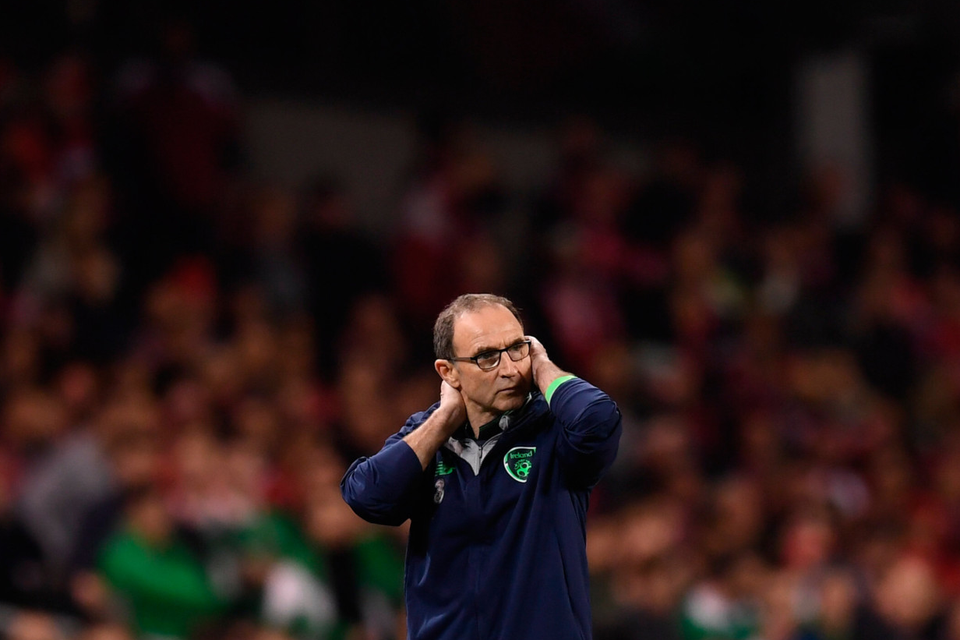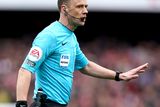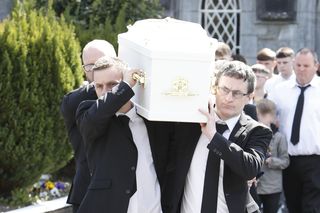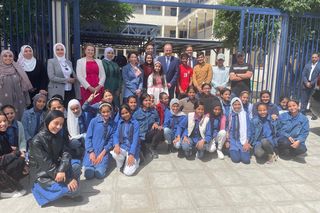Eamonn Sweeney: Let's just keep calm and carry on
'Our record is tolerable, our players are average and our manager has done as much as could be expected' Photo: Stephen McCarthy
I could write a piece about how Ireland's defeat by Denmark shows our utter poverty as a footballing nation, the terrible deficiencies in technique which will always see us struggle against good teams, the obvious shortcomings of Martin O'Neill as an international manager, our delusions about our status in world football and the sub-standard nature of some members of the current team.
I could but I won't. Because I've written it already, after we lost 3-0 to Belgium in last year's European Championships. Four days later Ireland turned around and beat Italy 1-0 to reach the second round of the tournament and send the country into a state of euphoria, thus proving that I, and quite a few others who'd also taken the dystopian view of the Belgium match, had been over-reacting.
Of course there was some over-reaction after the Italy game too, no-one seemed that keen to bring up the fact that the team we'd beaten with a late goal had already qualified for the knockout stages and didn't seem massively interested. In fact, Ireland probably played better in our draw against Sweden and our defeat by France than we did against Italy. Still, it was hailed as a performance for the ages.
Every big Irish football victory or defeat is accompanied by a carnival of over-reaction. Tuesday night's defeat is no exception. Painful it was, but a lot of the criticism sounded an unnecessarily apocalyptic note. Particularly notable was the view that our 28th competitive game under O'Neill in some way revealed the truth about the team.
It's an odd point of view when you think about it, judging a team by its worst ever performance, and one which perhaps indicates the grinding of axes long sharpened and set aside for use at a moment like this. Yet O'Neill's record as manager has to be looked at as a body of work. And the truth is that failure to make the World Cup finals doesn't constitute some massive step backwards.
There were 23 qualifying places available for the European Championships. Making the World Cup was almost twice as difficult with only 13 European teams, along with the host nation, making it to Russia. Ireland, Northern Ireland, Hungary, Slovakia and Wales, all of whom reached the last 16 in France, failed to qualify. The last three didn't even reach the play-offs. Ireland always faced a difficult task in reaching the finals, other absentees from which include the reigning South American champions Chile and the last two African Nations Cup champions, Cameroon and Ivory Coast. Italy will be absent for the first time since 1958 and the USA for the first time since 1986. On current form, we'd probably still qualify for the European Championships in 2020.
Still, there's no denying how utterly ignominious our defeat on Tuesday was and how much it owed to what seemed, even before the carnage began, a lunatic tactical decision by the manager. His decision to replace Harry Arter and David Meyler with Aiden McGeady and Wes Hoolahan, thus leaving Ireland with no defensive midfielder, is to O'Neill's career what Metal Machine Music was to Lou Reed's and 1941 to Steven Spielberg's. Not only did it not work, it was impossible to see how it could have been expected to work. The gleeful reaction of Danish manager Age Hareide after the game showed just what a gift it represented to his team. Expecting trench warfare in the second half, Denmark suddenly found themselves confronted by The Charge Of The Light Brigade. Someone had blundered.
It will be little consolation to O'Neill that this disastrous second half proved how wrong some of the previous accusations against him had been. A nightmarish 45 minutes showed just what would have happened had he 'gone for broke' or 'thrown off the shackles' in previous games. The contention that Denmark had been 'there for the taking' in Copenhagen had Ireland played a more attacking game was conclusively disproved.
There was plenty more unwise analysis after the game, the line 'why don't we produce players like Denmark's,' being particularly popular. Yet, before Tuesday night, Denmark had qualified for just two of the last six major tournaments while we'd made two out of three. It's 2002 since they made the knockout stage of a finals tournament, something Ireland did last year. The Danish way of doing things hardly offers a template for success.
We don't produce players like Christian Eriksen but neither do Denmark most of the time. Eriksen is their best player in 20 years, a magnificent outlier the way Roy Keane was for us a decade and a half ago. And like Keane, in his day, and Robert Lewandowski now, he put his team up on his back and carried it over the line. One great player, as Gareth Bale proved in last summer's Euros, can make a fierce difference.
Our over-reaction on Tuesday even spread to the manager whose declaration that he was having a rethink about continuing in the job seems to have been prompted by his irritation with the criticism he's been receiving. O'Neill's hypersensitivity in these matters verges on the pathological. How else can you explain his constant irritation with Tony O'Donoghue, a man you might impersonate if miming the word 'inoffensive' in a game of charades? It is an odd quirk in such an intelligent man, unreasonable though some of the attacks on him have been.
Irish football needs O'Neill to stay because too many of our managers have departed too early. It beggars belief that just a few months after the sterling effort at the 2002 World Cup finals Mick McCarthy was being forced from his post as boos rang around Lansdowne Road after a defeat by Switzerland. Brian Kerr's narrow failure - one goal in a frantic finale against Switzerland would have done it - to earn a play-off for a place in the 2006 World Cup finals should have entitled him to at least another two years in the job. Instead the shabby way Kerr was treated alienated the most gifted coach of young footballers this country has ever seen with predictable long-term consequences.
Even Jack Charlton, whose achievements look ever more impressive in retrospect, ended up being hounded out of the job, a 2-0 loss to an outstanding Holland team in a play-off for a place in the European Championships being judged unacceptable. The calls for O'Neill's head are no more sensible than the ones for Charlton's, Kerr's or McCarthy's.
Who would be his successor? Roy Keane? If O'Neill is judged to be a failure, why award the job to a man whose main qualification is that he was O'Neill's assistant? Sam Allardyce is second favourite with the bookies yet he would probably adopt the same approach as O'Neill and be unlikely to do it as well. Stephen Kenny would be a romantic choice yet he is unproven at the highest level. Chris Hughton would do a good job but seems happy where he is. Pretty soon the names mentioned become downright ludicrous, the likes of Paul Jewell, once touted by Eamon Dunphy as the man for the job and last seen resigning after a week as assistant coach at West Brom.
In any event you could guarantee that any new manager would before long become mocked and derided like his predecessors. Even a World Cup quarter-final place couldn't save Charlton from that. The criticism rightly aimed at O'Neill loses some of its force when you consider that some of his detractors wouldn't have reacted very differently had we made the finals. We'd be back to 'Oh, the Irish are happy just to reach the finals. Why aren't we trying to win it?' and such rubbish.
After all, the Dublin match was preceded by much criticism of Ireland for betraying the spirit of football in our 0-0 draw in Copenhagen. Yet, before kick-off in Dublin, there had been six scoreless draws in a row in the play-offs. Saturday's match might have been dour but it was not unusually so for this stage of the competition. Presumably those whose aesthetic sensibilities were offended took delight in the plethora of goalmouth incident on Tuesday.
As things followed the usual grisly post-defeat pattern, Dunphy blaming the first goal on O'Neill being some kind of training ground dosser and resurrecting old jibes at Keane, fans being slagged off for leaving the Aviva early when on previous occasions they'd been criticised for supporting Ireland to the end, claims that the 'best supporters in the world' tag had suddenly proved false when nobody really thought it was true in the first place, calls for some new vaguely defined 'modern approach', suggestions that locked within our team is an ability to play sparkling football stymied by O'Neill, as it apparently has been by every manager before him, it struck me that the only thing worse than watching Ireland bigging itself up is watching Ireland beat itself up. They're two sides of the same coin really, rooted in self-importance and a belief in a kind of Irish exceptionalism. Our emotional barometer seems permanently set to a state of riot.
Yet in the end what are we? A small mid-level footballing nation which sometimes gets it wrong and sometimes gets it right, which will never win a major trophy but can guarantee its fans a number of big days and happy memories and which, in the next qualifying campaign, will win a few, lose a couple and maybe draw more games than anything else. Our record is tolerable, our players are average and our manager has done as much as could be expected.
I drifted off to sleep on Tuesday night thinking of the 1987 Connacht football final between Mayo and Roscommon. In my first job as a reporter I'd worked hard on a big preview section for the Roscommon Champion. Roscommon at the time were a game but limited side who didn't get going on the day and were well beaten. As I walked out of Hyde Park, a middle-aged man came over to me and shouted, "Now you can write the truth about them, that they're shite."
It would have been the easiest thing to do. It always is. But Roscommon weren't shite and most of the players involved that day would win a couple of Connacht titles before their careers were up. Even the worst of defeats are never quite as apocalyptic as they seem. Teams good enough to put themselves into big games usually prove good enough to bounce back. Ireland will do the same.
It's just going to take a bit longer than four days.















